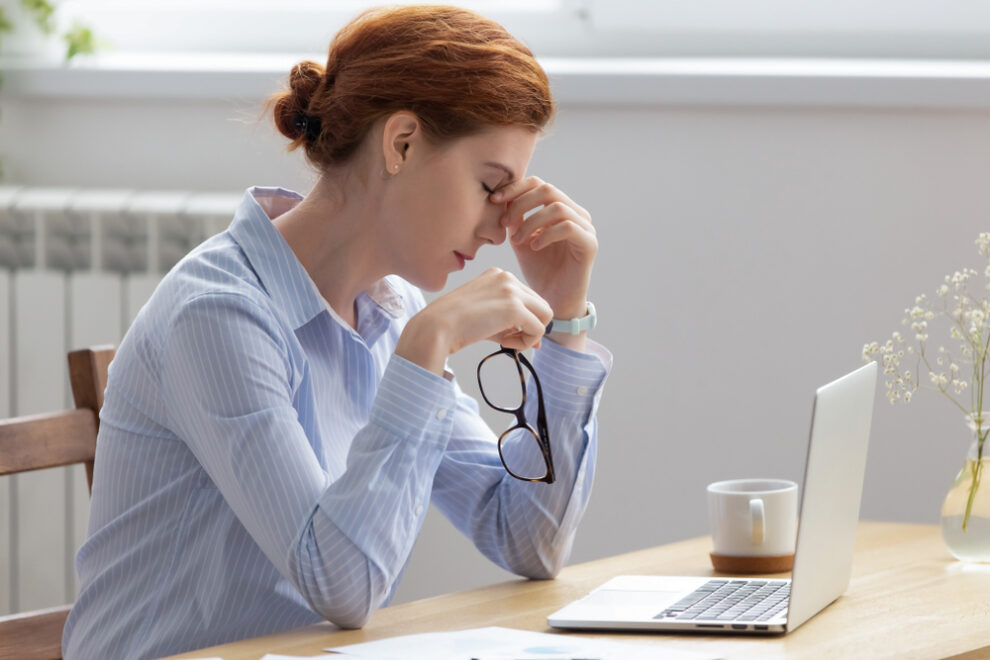Posted by: Dr. Ramsarat in Dry Eye, Eye Health

Dry eye is a condition characterized by a decrease in the quality or quantity of tears, the essential lubricants of the eye. These tears play a vital role in maintaining the health of the front surface of the eye and ensuring clear vision. Dry eye can occur when the eye doesn’t produce enough tears or when the tears aren’t of the correct consistency and evaporate too quickly. It’s a chronic and progressive condition, which, if left untreated, can lead to more complications.
Recognizing The First Stages Of Dry Eye
The symptoms associated with the first stages of dry eye can vary from person to person. However, common indicators include a stinging or burning sensation in the eyes, redness, excessive tearing, a feeling of something in the eyes, and occasional blurred vision.
As the condition progresses, you may find that you’re more sensitive to light, have difficulty driving at night, or experience discomfort when using digital devices for prolonged periods. In severe cases, you may even notice a decrease in your overall quality of vision.
The symptoms of dry eye can also manifest as watery eyes. This might seem counterintuitive, but when your eyes are dry, your body may respond by producing an excess of tears. This is a natural response to eye irritation, but these tears are often of poor quality and do little to alleviate the dryness.
The Role Of An Optometrist In Diagnosing Dry Eye
When it comes to diagnosing dry eye, an optometrist plays a crucial role. If you’re experiencing any of the symptoms associated with dry eye, it’s important to schedule an appointment with your optometrist.
Your optometrist will then perform a comprehensive eye exam, including tests to measure the volume and quality of your tears. Through these tests, your optometrist can determine whether you have dry eye, the severity of your condition, and the best course of treatment. The earlier dry eye is diagnosed, the more effectively it can be managed.
Preventative Measures For Dry Eye
While there is no surefire way to prevent dry eye entirely, certain measures can help reduce your risk or alleviate the severity of the symptoms. These include staying hydrated, eating a diet rich in omega-3 fatty acids, taking regular breaks from screen time, and using a humidifier in dry environments.
Wearing sunglasses outdoors, particularly those designed to block wind and dry air, can also help protect your eyes. If you wear contact lenses, make sure you’re following your eye doctor’s instructions for care and replacement.
These preventative measures are most effective when combined with regular eye exams. Early detection and treatment can significantly reduce the long-term impact of dry eye.
Treating Your Dry Eye
Once dry eye has been diagnosed, your optometrist will play a central role in treating your condition. The treatment for dry eye often depends on the underlying cause and severity of your symptoms. Your optometrist may recommend artificial tears, prescription eye drops, or lifestyle modifications such as improving your diet or changing your screen habits.
In some cases, your optometrist may recommend procedures to help your eyes produce more tears or to keep your tears from draining away too quickly. These can include punctal plugs, which block the tear ducts, or thermal pulsation treatment, which unclogs the oil glands in your eyelids.
The goal of dry eye treatment is to restore or maintain the normal amount of tears in the eyes to minimize dryness and related discomfort and to maintain eye health.
Take Proactive Measures For Optimal Eye Health Today
Understanding the first stages of dry eye and the importance of regular eye exams is crucial to maintaining good eye health. Dry eye is a condition that can significantly impact your quality of life if left untreated. However, with early detection and treatment guided by your optometrist, it’s a condition that can be effectively managed.
Schedule regular eye exams, pay attention to any changes in your vision or comfort, and don’t hesitate to seek professional help if you suspect you might be experiencing the first stages of dry eye.
If you are experiencing symptoms of dry eye, consult with Dr. Veronica Ramsarat, OD at our office in New York, New York. We provide our patients with the tools they need for disease prevention and management. Please call or text (833) 255-0096 to schedule an appointment today.